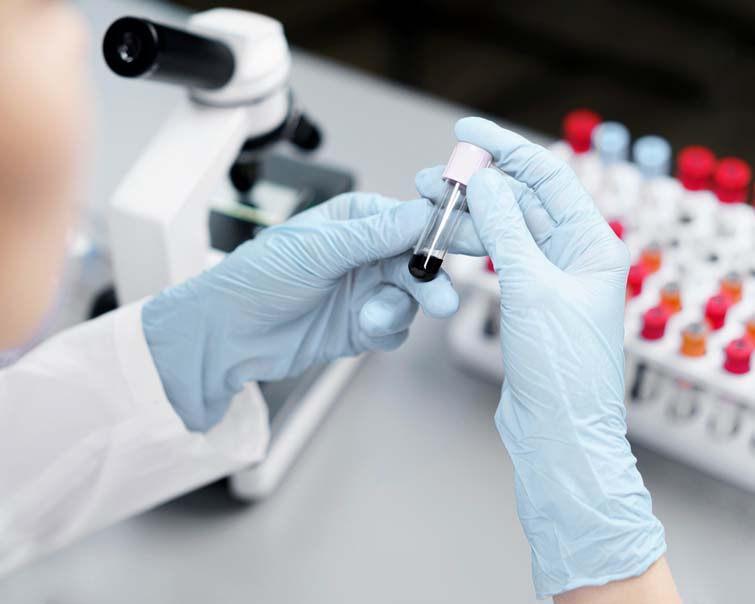
Sexual health is a crucial aspect of overall well-being, but it’s understandable that discussing STDs can be uncomfortable or embarrassing for many. However, it’s essential to break down the stigma and prioritize our health by seeking the information we need to make informed decisions. In this blog, we will address seven common questions about STD testing in Bridgeport, CT, providing you with essential knowledge to take control of your sexual health and foster a healthier community in Bridgeport.
One of the critical reasons to get STD testing in Bridgeport, CT, is that many of these infections can remain asymptomatic for extended periods. For example, chlamydia and gonorrhea are known as “silent” infections, as they often show no symptoms, especially in the early stages. Without visible signs, individuals may unknowingly pass the infection to their sexual partners, exacerbating the spread of STDs. Regular testing is the only way to detect these infections early, ensuring timely treatment and preventing potential complications.
Early detection and treatment of STDs are crucial for maintaining overall health and well-being. Left untreated, STDs can lead to severe complications such as infertility, chronic pain, and an increased risk of certain cancers. For instance, untreated chlamydia can cause pelvic inflammatory disease (PID) in women, potentially damaging the reproductive organs. By getting tested for STDs in Bridgeport, CT, you can receive prompt treatment if necessary, mitigating the risks of long-term health consequences.
Undergoing STD testing in Bridgeport, CT, is not just about your own health but also about protecting your sexual partners. Being aware of your STD status allows you to make informed decisions about your sexual activities, ensuring you don’t unknowingly transmit infections to others. Open communication about testing and sexual health with your partners fosters a safer and more trusting environment for everyone involved. Taking responsibility for your sexual health contributes to a healthier community and reduces the overall prevalence of STDs in Bridgeport.
High STD rates can have a significant impact on the health and well-being of the Bridgeport community. By getting tested regularly for STDs, you play an active role in reducing the transmission of infections. Timely detection allows for the initiation of appropriate treatment, which can effectively control the spread of infections. Additionally, healthcare providers may offer counseling and prevention strategies to further protect yourself and your partners from STDs.
Raising awareness about STD testing in Bridgeport, CT, contributes to fostering a positive sexual health culture within the community. Encouraging open discussions about sexual health reduces the stigma surrounding STDs and encourages individuals to prioritize their well-being. A proactive approach to sexual health empowers individuals to seek the information and support they need to make responsible choices, ultimately leading to a healthier and more informed community.


Sexually transmitted diseases (STDs) are a significant public health concern in Bridgeport, CT, as they are in many urban areas. The city’s diverse population, high population density, and limited access to healthcare services contribute to the higher incidence of STDs. Chlamydia, gonorrhea, syphilis, and HIV are among the most commonly reported STDs in the area. It’s crucial to be aware of the prevalence of STDs in Bridgeport, CT, to take proactive steps in protecting your sexual health and the well-being of the community. As such, STD testing in Bridgeport, CT, will help alleviate this issue.
Certain demographic groups in Bridgeport, CT, are at higher risk of contracting STDs. Young adults aged 15 to 24, for instance, have consistently shown higher rates of STD infection than other age groups. Additionally, individuals with multiple sexual partners, men who have sex with men, and those engaged in high-risk sexual behaviors are also more susceptible to STDs. Identifying these high-risk groups allows healthcare providers to target prevention efforts and increase outreach to ensure better access to STD testing in Bridgeport, CT.
Lack of awareness and education about STDs plays a significant role in the high prevalence of these infections in Bridgeport, CT. Misconceptions and stigma surrounding STDs can prevent individuals from seeking timely testing and treatment. Additionally, a lack of comprehensive sexual education in schools and limited access to information about safe sex practices may contribute to the spread of STDs. By addressing these gaps in knowledge, communities can empower individuals to make informed choices about their sexual health and encourage them to undergo regular STD testing in Bridgeport, CT.
To combat the rising STD rates, it is crucial to promote STD testing in Bridgeport, CT, as well as prevention efforts. Healthcare providers, community organizations, and public health agencies must work collaboratively to increase awareness about the importance of regular testing, safe sex practices, and the availability of confidential testing services in the city. Through proactive education and accessible testing options, we can reduce the prevalence of STDs, enhance overall sexual health, and foster a healthier community in Bridgeport, CT.

Undergoing STD testing in Bridgeport, CT, is a non-invasive and painless process. Depending on the type of STD being tested for, the healthcare provider may collect samples through blood tests, urine tests, or swabs. For blood tests, a small needle is used to draw a blood sample, which typically causes minimal discomfort. Urine tests involve providing a urine sample, while swab tests may require samples from areas such as the genital, oral, or rectal regions. Rest assured that healthcare professionals prioritize your comfort and privacy during the testing process.
Your privacy and confidentiality are of the utmost importance during STD testing in Bridgeport, CT. Healthcare providers understand the sensitivity of the topic and take all necessary precautions to ensure that your personal information and test results remain confidential. You can feel confident that your identity and health information will be protected, allowing you to undergo testing discreetly and without any judgment.
During STD testing in Bridgeport, CT, you’ll interact with professional and compassionate healthcare providers who are experienced in conducting these tests with empathy and care. They are committed to making the testing experience as comfortable as possible for you. If you have any questions or concerns about the testing process, don’t hesitate to communicate with the healthcare provider. They are there to address your worries and provide the necessary support throughout the testing procedure.
In many cases, you can expect to receive quick and timely results from STD testing in Bridgeport, CT. Some tests may provide results within a few hours, while others might take a few days, depending on the specific type of STD being tested and the testing method used. Timely results are essential for early detection and prompt treatment, should it be necessary. Your healthcare provider will inform you of the expected timeframe for receiving your results and will guide you through the next steps accordingly.
The primary goal of an STD test in Bridgeport, CT, is to empower you to make informed decisions about your sexual health. Whether your test results are positive or negative, knowing your status allows you to take appropriate actions to protect yourself and your sexual partners. In the event of a positive result, your healthcare provider will guide you through the necessary steps for treatment and prevention. Remember that STD testing is a responsible choice that reflects your commitment to your well-being and the well-being of others in the community.

Anyone who is sexually active should consider getting tested for STDs in Bridgeport, CT. Regardless of age or relationship status, sexual activity can potentially expose individuals to infections. Whether you have multiple sexual partners or are in a monogamous relationship, regular STD testing in Bridgeport, CT, is a responsible choice that reflects your commitment to your sexual health and that of your partners.
If you are starting a new sexual relationship in Bridgeport, CT, it’s essential to prioritize your sexual health by getting tested for STDs. Starting a new relationship involves trusting your partner with your well-being, and knowing your STD status promotes open communication and mutual responsibility. Encouraging your partner to get tested as well fosters a safer sexual environment for both of you.
Individuals who engage in sexual activities with multiple partners are at higher risk of contracting and spreading STDs. Consistent and correct condom use is essential for reducing the risk, but regular STD testing in Bridgeport, CT, is equally important. By knowing your status, you can protect both yourself and your partners, and take appropriate measures if needed.
If you have had an STD in the past, it’s crucial to continue regular testing to monitor your sexual health. Some STDs, like herpes and HIV, are chronic and may require ongoing management and treatment. Regular testing ensures that any infections are detected early, enabling timely intervention and preventing potential complications.
Engaging in high-risk sexual behaviors, such as unprotected sex with casual partners or intravenous drug use, increases the chances of contracting STDs in Bridgeport, CT. If you find yourself engaging in such behaviors, regular STD testing in Bridgeport, CT, becomes even more critical. Healthcare providers can offer counseling and support to help you make safer choices and reduce the risk of infection.
Pregnant individuals should also undergo STD testing in Bridgeport, CT, as part of routine prenatal care. Some STDs, like syphilis and HIV, can be transmitted from mother to child during pregnancy or childbirth. Early detection and treatment can significantly reduce the risk of transmission and protect both the mother and the baby’s health.

STD testing in Bridgeport, CT, is conducted with strict adherence to patient confidentiality laws and regulations. Healthcare providers are legally obligated to protect your privacy and ensure that your personal information and test results remain confidential. Your test results are never shared with anyone without your explicit consent, including your sexual partners, family members, or employers. Rest assured that your identity and health information are safeguarded during the testing process.
Healthcare professionals understand the sensitive nature of STD testing in Bridgeport, CT, and the importance of discretion. They are trained to handle these situations with empathy and professionalism, creating a safe and non-judgmental environment for patients seeking testing. You can feel comfortable discussing your concerns and sharing personal information with healthcare providers, knowing that they prioritize your comfort and privacy.
Many testing facilities in Bridgeport, CT, offer anonymous or confidential testing options, allowing you to undergo testing discreetly if you prefer. Anonymous testing involves providing a sample without revealing your identity, while confidential testing means that your personal information is collected but remains protected. Whether you choose anonymous or confidential testing, your results are communicated only to you in a confidential manner.
Healthcare providers in Bridgeport, CT, maintain stringent protocols for the secure handling of health records, including STD testing results. Electronic health records (EHRs) and paper records are protected with advanced security measures to prevent unauthorized access. Access to your health records is limited to authorized personnel, ensuring that your information is only accessible to those directly involved in your care.
Confidentiality extends beyond protecting your personal information; it also involves creating a judgment-free environment where you can openly discuss your sexual health. Healthcare providers in Bridgeport, CT, are committed to providing compassionate care that respects your privacy and individual circumstances. Regardless of your STD status, you can trust that you will be treated with respect and understanding throughout the testing process.

After a potential exposure to STDs in Bridgeport, CT, getting tested at the appropriate time is crucial for accurate results and timely intervention if necessary. Different STDs have varying incubation periods, which is the time between exposure to the infection and when symptoms may start to appear or when the infection can be detected through testing. Understanding the incubation periods for different STDs helps ensure that you receive reliable results and appropriate medical care.
The incubation periods for common STDs can range from a few days to several weeks. For example, chlamydia and gonorrhea may become detectable through testing within one to two weeks after exposure, while HIV may take several weeks to a few months. Syphilis has an incubation period of around three weeks, but it can vary. It’s essential to be aware of these timeframes to determine the most appropriate timing for STD testing in Bridgeport, CT, after possible exposure.
The timing of STD testing in Bridgeport, CT, may also be influenced by the specific high-risk behaviors you engaged in. For instance, if you had unprotected sex with a partner whose STD status is unknown, you might consider testing sooner rather than later. Additionally, if you engage in sexual activities with multiple partners, it’s prudent to undergo testing more frequently to monitor your sexual health regularly.
If you experience any symptoms of a potential STD after exposure, do not wait for the incubation period to pass; seek testing immediately. Some STDs, like herpes and syphilis, may present with visible symptoms, such as sores or rashes. However, other STDs, like chlamydia and gonorrhea, may be asymptomatic in the early stages. If you notice any unusual symptoms or changes in your genital, oral, or rectal regions, do not hesitate to get tested promptly.
If you’re unsure about the appropriate timing for STD testing in Bridgeport, CT, after possible exposure, consulting a healthcare professional can provide personalized guidance. Your healthcare provider can assess your individual situation, including the type of exposure, the specific STD in question, and any symptoms you may be experiencing. Based on this assessment, they can recommend the most suitable timing for testing to ensure reliable results.

If you receive a positive result from STD testing in Bridgeport, CT, the first step is to receive supportive counseling and education from your healthcare provider. They will explain the implications of the positive result, the specific STD you have, and the available treatment options. This counseling session is an opportunity for you to ask questions and receive accurate information about managing the infection and protecting your sexual partners.
For many STDs, early detection is crucial for successful treatment and management. If you test positive, your healthcare provider will discuss the appropriate treatment plan based on the specific infection. They will provide you with medications or other interventions to address the infection effectively. Prompt treatment not only helps alleviate symptoms but also reduces the risk of complications and the transmission of the infection to others.
In certain cases, healthcare providers may perform contact tracing and partner notification to prevent further spread of the infection. This process involves informing your recent sexual partners about your positive test result, without disclosing your identity, and encouraging them to get tested for STDs in Bridgeport, CT. Partner notification is a vital public health measure that helps identify and treat individuals who may have been exposed to the infection.
After starting treatment for an STD, your healthcare provider will schedule regular follow-up appointments to monitor your progress and ensure that the infection is responding to treatment. They may conduct additional tests to confirm that the infection has been effectively treated. Regular follow-up is essential for managing chronic STDs and preventing recurrence.
Testing positive for an STD can be a wake-up call to prioritize safer sex practices and prevention. Your healthcare provider will offer guidance on how to prevent future infections and protect yourself and your partners. Safer sex education may include information on using condoms correctly, discussing sexual health with partners, and reducing high-risk behaviors.
Receiving a positive STD test result can be emotionally challenging. Your healthcare provider will provide emotional support and connect you with resources such as support groups or counseling services in Bridgeport, CT. It’s essential to remember that testing positive for an STD does not define you, and seeking support can help you cope with the emotional aspects of the diagnosis.
At Docs Primary Care – Bridgeport, we understand the importance of confidential and timely STD testing. Our experienced and compassionate healthcare professionals are here to support you through the testing process, ensuring a comfortable and judgment-free environment. With our state-of-the-art facilities, we offer STD testing with results available in just 20 minutes, providing you with prompt and accurate information about your sexual health. Your privacy is our top priority, and we adhere to strict confidentiality measures to safeguard your personal information. Don’t wait; take proactive steps towards maintaining your sexual well-being. Contact us today to schedule a consultation!

During this surge in COVID-19 cases, our primary focus is meeting the high demand for tests, and we are seeing higher than usual wait times. This means we are unable to answer most phone calls. Please know that our teams are working very hard during this time to care for as many patients as safely as possible. Please click the button below for answers to common questions. We appreciate your understanding.